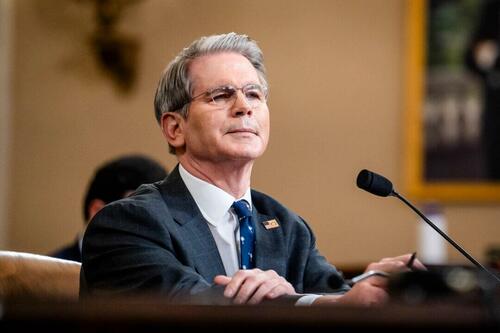Treasury Secretary Scott Bessent on Monday called for a “fundamental reset” of financial regulations to ensure they are aligned with the nation’s domestic and international priorities.
Speaking at the Federal Reserve Capital Conference, Bessent said there is a need for “deeper reforms” in bank regulation, noting that the system has been marked by “regulation by reflex,” where bank regulators tend to introduce new rules after issues have already occurred.
“Rather than preempting crises, regulators all too often react to them after the fact. They play the role of a hazmat cleanup team instead of preventing dangerous spillovers in the first place,” Bessent said.
“Rather than reflexively regulate anything that hits the headlines, we need to instead be more explicit about our vision for the financial system,” he added.
As Aldgra Fredly reports for The Epoch Times, Bessent said the Treasury will reinforce reform efforts by working to “break through policy inertia, settle turf battles, drive consensus, and motivate action to ensure no single regulator holds up reform.”
.@SecScottBessent: “What we need to do is examine the entire Federal Reserve institution and whether they have been successful… All of these Ph.D.s over there, I don’t know what they do… This is like Universal Basic Income for academic economists.” pic.twitter.com/ITzSwQKpjS
— Rapid Response 47 (@RapidResponse47) July 21, 2025
He suggested that bank regulators should review outdated capital requirements that place “unnecessary burdens on financial institutions” and reduce bank lending.
Bessent specifically referenced a July 2023 proposal that would subject banks to two sets of capital requirements. He believes that bank regulators should consider scrapping the dual-requirement structure.
“This dual-requirement structure did not derive from a principled calibration methodology. It was motivated simply to reverse-engineer higher and higher capital aggregates,” he said.
Bessent noted that the framework “was at odds with capital reform as a modernization project because it would have preserved the antiquated capital requirements as the binding floor for many, perhaps most, large banks.”
He also suggested allowing any bank that is not subject to modernized capital requirements the choice to opt in, extending the benefits of reduced capital requirements to smaller banks.
“We cannot give only large banks the benefit of these reduced requirements, as actually contemplated by the last administration,” he said.
The Trump administration has been at loggerheads with the Federal Reserve over interest rate cuts. President Donald Trump wanted the Fed to lower interest rates to make borrowing less expensive, but the central bank has kept its benchmark policy rate unchanged at 4.25 to 4.50 percent.
Federal Reserve Chair Jerome Powell has said the lack of certainty over tariff-driven inflation has made the Fed delay lowering interest rates for now, since price impacts are expected to manifest weeks or months after tariffs settle into the markets.
In a social media post on Monday, Bessent called on the Fed to conduct “an exhaustive internal review” of its non-monetary policy operations, noting that the central bank has been “threatened by persistent mandate creep into areas beyond its core mission.”
“The Fed does regular reviews of its monetary policy framework. I would urge Fed leadership to similarly undertake, publish and implement a comprehensive institutional review across its entire mission to buttress its credibility,” he stated on X, citing excerpts from his interview with CNBC that aired on July 21.
When pressed on whether he advised Trump not to try to fire Jerome Powell Bessent kept mum, but he did suggest that the Federal Reserve as an institution needs to be examined.
“We should think has the organization succeeded in its mission? If this was the FAA and we were having this many mistakes, we would go back and look at why has this happened.”
On some views the tale of the tape is not flattering for the Fed.
-
On financial stability they arguably played a major role in seeding the 2008 financial crisis via too-low interest rates after 9/11 and were then slow in responding once the crisis emerged (remember Bernanke saying sub-prime is “contained”?).
-
On banking regulation they seem to have missed the vulnerabilities inherent in the balance sheets of Silicon Valley Bank and others (to say nothing of Bear Stearns, Lehman etc) which they then blew up through their conduct of monetary policy.
-
On the question of monetary policy itself, many will remember the erroneous assurances that the inflation is transitory – a mistake repeated all around the world.
Bessent went on to muse over “all these PHDs over there, I don’t know what they do. This is like universal basic income for academic economists.”
Bessent’s criticism of the Fed’s ability to fulfill its basic mission of providing stability to financial markets, regulating the banking system and conducting monetary policy might suggest that Trump could bypass questions of whether he has the legal authority to fire Powell and ‘do an Andrew Jackson’ by abolishing the central bank altogether.
Loading…


















